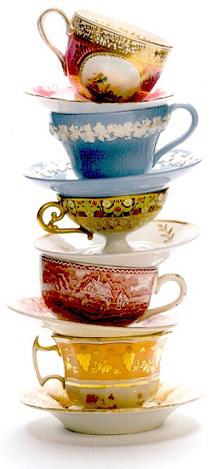Reading all this I really need my coffee.





http://www.huffingtonpost.com/...efits_n_4102133.html
This will tell you more about the benefits of drinking some coffee.
Enjoy!
I love your cups Sue.
I keep hearing good news about drinking some coffee as well.
We can use one of the cups which will make the coffee taste even better.
 Science-Backed Benefits of Coffee:
Science-Backed Benefits of Coffee:I am still enjoying my coffee.
I grew up with it in France, and will keep drinking my 3 cups a day.
Sometimes 4.
 For immediate release: November 16, 2015
For immediate release: November 16, 2015
Boston, MA – People who drink about three to five cups of coffee a day may be less likely to die prematurely from some illnesses than those who don’t drink or drink less coffee, according to a new study by Harvard T.H. Chan School of Public Health researchers and colleagues. Drinkers of both caffeinated and decaffeinated coffee saw benefits, including a lower risk of death from cardiovascular disease, neurological diseases, type 2 diabetes, and suicide.
“Bioactive compounds in coffee reduce insulin resistance and systematic inflammation,” said first author Ming Ding, a doctoral student in theDepartment of Nutrition. “That could explain some of our findings. However, more studies are needed to investigate the biological mechanisms producing these effects.”
The study will appear online in Circulation on November 16, 2015.
Researchers analyzed health data gathered from participants in three large ongoing studies: 74,890 women in the Nurses’ Health Study; 93,054 women in the Nurses’ Health Study 2; and 40,557 men in the Health Professionals Follow-up Study. Coffee drinking was assessed using validated food questionnaires every four years over about 30 years. During the study period, 19,524 women and 12,432 men died from a range of causes.
In the whole study population, moderate coffee consumption was associated with reduced risk of death from cardiovascular disease, diabetes, neurological diseases such as Parkinson’s disease, and suicide. Coffee consumption was not associated with cancer deaths. The analyses took into consideration potential confounding factors such as smoking, body mass index, physical activity, alcohol consumption, and other dietary factors.
“This study provides further evidence that moderate consumption of coffee may confer health benefits in terms of reducing premature death due to several diseases,” said senior author Frank Hu, professor of nutrition and epidemiology. “These data support the 2015 Dietary Guidelines Advisory Report that concluded that ‘moderate coffee consumption can be incorporated into a healthy dietary pattern.’”
There are many health benefits associated with drinking coffee. Check a number of websites that will explain the benefits of coffee. Drink as much as you like.

I am still enjoying my coffee...yumm!!!

Still enjoying my coffee. Nice of the doggy to bring it to me.
It is the season to enjoy your coffee.
Drink it in moderation, and it is very good for you.


Glad the coffee post is back. Don't know what I would do without coffee?

I have actually started to like coffee, and drink a fair bit of it.

I will be drinking my heavenly KONA coffee tomorrow.
yoko, I will borrow your lovely image, it does justice to the Hawaiian coffee.

A cup of coffee shared with a friend is happiness tasted and time well spent.
Unknown

While past studies hinted that coffee might have a dark side, newer research suggests that it may actually have health benefits.
Why the reversal? It's hard to look at just one aspect of diet and connect it to a health condition because so many other factors that could play a role. For example, early research on coffee didn't always take into account that heavy coffee drinkers also tended to use tobacco and be sedentary.
When newer studies adjusted for such factors, they found a possible association between coffee and decreased mortality. Coffee may offer some protection against:
Coffee still has potential risks, mostly due to its high caffeine content. For example, it can temporarily raise blood pressure. Women who are pregnant, trying to become pregnant or breastfeeding need to be cautious about caffeine. High intake of boiled, unfiltered coffee has been associated with mild increase in cholesterol levels.
The bottom line? Your coffee habit is probably fine and may even have some benefits. But if you have side effects from coffee, such as heartburn, nervousness or insomnia, consider cutting back.
From the Mayo Clinic.

Thank you again Sue for this post. I drink my 4 cups of coffee every day, and I really enjoy it.
Looks like we all still enjoy our coffee.

I do enjoy coffee. I was brought up drinking tea, but once I got used to coffee I really enjoy it.

I found another website that promotes some coffee:
https://www.healthline.com/nut...ffee#The-bottom-line
1.Coffee contains caffeine, a stimulant that has been shown to increase energy levels and decrease fatigue by altering levels of certain neurotransmitters in the brain.
2.Regular coffee consumption may be linked to a lower risk of developing type 2 diabetes over the long term.
3.Some research suggests that drinking coffee could help protect against Alzheimer’s disease, Parkinson’s disease, and cognitive decline.
4.Coffee could help support weight management and may be linked to decreased body fat. One study also found that people who consumed coffee were more likely to be physically active.
5.Several studies have found that coffee could be linked to a lower risk of depression and may even be linked to a lower risk of death by suicide.
6.Coffee consumption could be linked to a decreased risk of death from chronic liver disease, along with other conditions, like liver scarring and liver cancer.
7.Some research shows that drinking coffee could be linked to a lower risk of heart disease, stroke, and heart failure.
8.Coffee could be associated with a lower risk of death, regardless of other factors, like age, weight status, or alcohol consumption. Still, more research is needed.
9.Coffee could improve physical performance and endurance when consumed before exercising. However, some studies have turned up mixed results.

.
Thank you for the new update. I grew up with tea, but now I really enjoy coffee.
LOVE my COFFEE!!!

I also love the chocolate that goes with it.